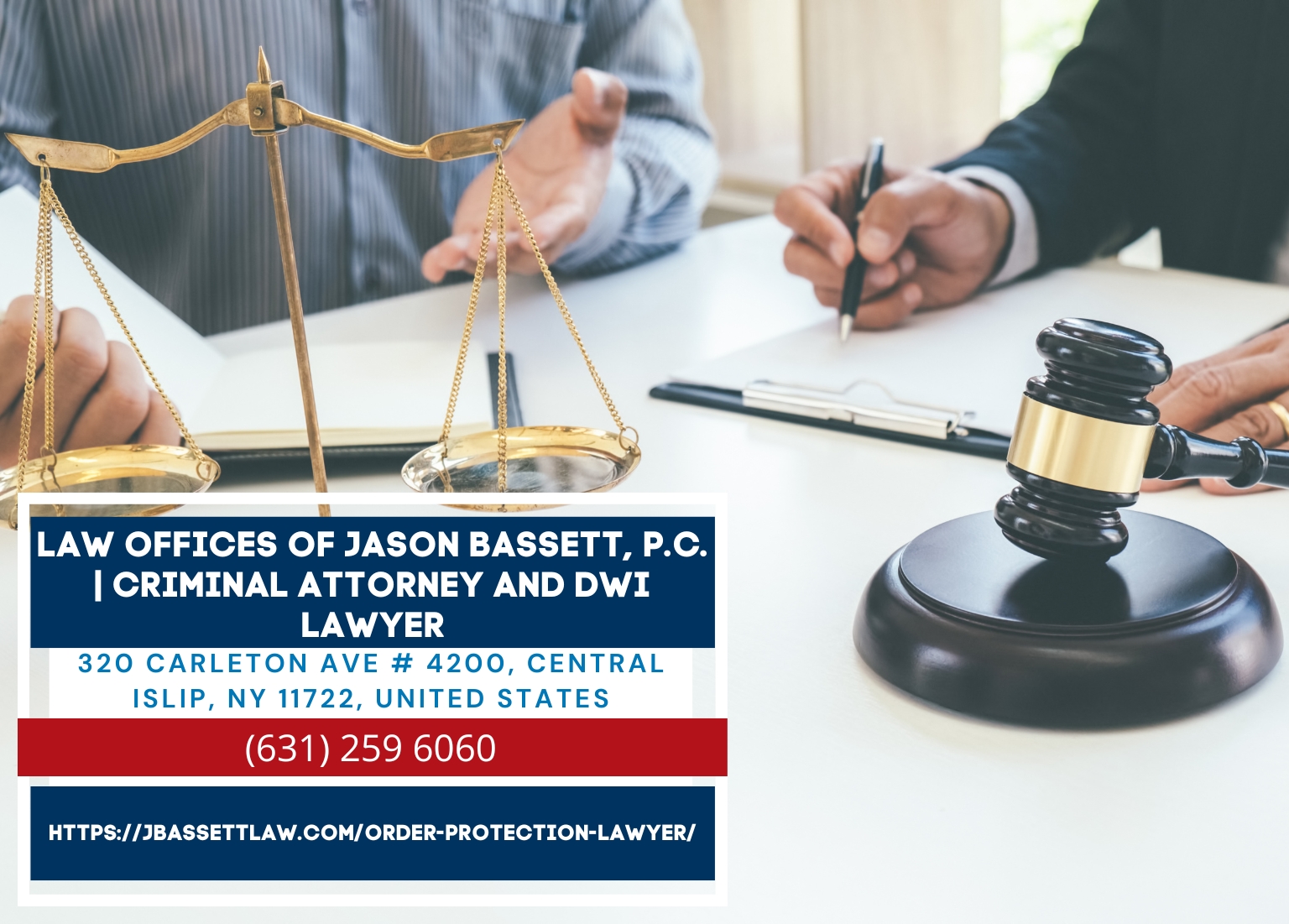Suffolk County order of protection lawyer Jason Bassett of the Law Offices of Jason Bassett, P.C. has published a detailed article addressing the complexities of orders of protection and their impact on individuals involved in criminal or family law cases. This comprehensive piece provides valuable information on what orders of protection entail, the legal consequences of violating them, and the steps one can take to challenge or modify such orders in New York.
“An order of protection can significantly impact a person’s life, especially if it results in being removed from their home or restricted from seeing family members,” said Suffolk County order of protection lawyer Jason Bassett. “Understanding the legal implications and knowing one’s rights is crucial for anyone facing this type of court order.”
According to the Suffolk County order of protection lawyer, orders of protection, commonly known as restraining orders, are issued to limit contact between an accused individual and their accuser. These orders are often issued in criminal cases involving domestic violence, assault, harassment, or endangering the welfare of a child. They can also be issued in family court cases where there is an intimate or familial relationship between the parties.
As outlined in the article, orders of protection are legal tools designed to prevent contact between individuals in situations where there is an alleged threat of harm. They can be issued temporarily during the course of a criminal case or permanently following a court hearing. In criminal cases, a temporary order of protection may remain in place until the case concludes, while a permanent order of protection can last for one year or longer, depending on the circumstances.
Bassett outlines two types of orders of protection in New York: Full (Stay-Away) Orders, which require the accused to avoid the protected party and certain locations, and Limited (Refrain From) Orders, which focus on prohibiting specific behaviors like harassment or threats without banning all contact.
“Each situation is unique, and the type of order issued depends on the circumstances of the case,” said Bassett. “For example, a full stay-away order may be necessary in cases involving serious allegations, while a limited order might be more appropriate in less severe situations.”
The article emphasizes that only a judge has the authority to modify or vacate an order of protection. Even if the protected party wants to lift the order, the accused must petition the court for a change. This process can be complex, and having a skilled attorney is critical to managing the legal system effectively.
Bassett warns against violating the terms of an order, even if the protected party initiates contact. “New York law does not hold the protected party accountable for violating an order of protection; it only holds the accused responsible. This means that even consensual contact can result in criminal charges for the accused,” he explained.
He also highlights that false allegations of abuse or domestic violence can lead to unjust orders of protection. Such accusations are sometimes used as leverage in family law disputes, such as custody battles or property division. In these situations, Bassett advises taking a proactive approach to defend against these claims and protect one’s rights.
“False allegations are, unfortunately, not uncommon, especially in contentious family law cases,” said Bassett. “If someone has been falsely accused, it’s essential to work with an attorney who can challenge the credibility of the accusations and present evidence that supports the case.”
Violating an order of protection can lead to severe legal consequences, adding to any existing charges. Offenders may face Criminal Contempt in the Second Degree (Class A misdemeanor, up to 364 days in jail and $1,000 in fines), Criminal Contempt in the First Degree (Class E felony, up to four years in prison and $5,000 in fines), or Aggravated Criminal Contempt (Class D felony, up to seven years in prison and $5,000 in fines).
“These penalties can have a lasting impact on one’s life, affecting everything from personal reputation to professional opportunities,” said Bassett. “That’s why it’s so important to comply with the terms of an order and seek legal counsel immediately if it is believed to be unjust or in need of modification.”
The article advises individuals subject to an order of protection to strictly adhere to its terms and avoid any contact with the protected party, whether direct or indirect. Violations, even when unintentional or minor, can lead to additional criminal charges.
An order of protection can create significant challenges, but it doesn’t mean the accused is without legal options. By working with an attorney who understands the nuances of New York law, individuals can approach the legal process with confidence and work toward a resolution that safeguards their rights and future.
About The Law Offices of Jason Bassett, P.C.:
The Law Offices of Jason Bassett, P.C., based in Suffolk County, New York, provides dedicated legal representation in criminal defense cases, including those involving orders of protection. The firm is committed to helping clients understand the legal system and achieve the best possible outcomes. Jason Bassett works tirelessly to protect the rights of individuals facing challenging legal situations, offering thoughtful guidance and strong advocacy throughout the process.
Embeds:
Youtube Video: https://www.youtube.com/watch?v=VWIdkHlUwSc
GMB: https://www.google.com/maps?cid=695024758410642184
Email and website
Email: bassettlaw@live.com
Website: https://jbassettlaw.com/
Media Contact
Company Name: Law Offices of Jason Bassett, P.C.
Contact Person: Jason Bassett
Email: Send Email
Phone: (631) 259-6060
Address:320 Carleton Ave Suite 4200
City: Central Islip
State: New York 11722
Country: United States
Website: https://jbassettlaw.com/

